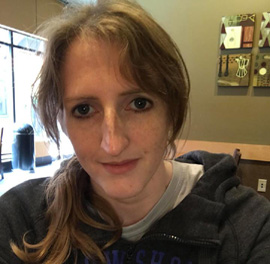Tullio's an author who believes the greatest virtue of speculative fiction is the Socratic exercise. Suppose blank: what are your choices, what are your beliefs? In his view, a good speculative story can tell you more about yourself as a reader than about the author who crafted it, because it doesn't beat you on the head with a stick: it confronts you with a complex situation akin to those we face in every day real life. That's what goes into his writing.
So, let me start with an obvious one. What are you working on?
Tullio: Hello, Ash! Let me just say I'm very happy to be here. My main WIP is a sci-fi novel, sprinkled with alternate history. The setting is the result of WW2 ending on white peace that allowed all major combatants to survive, and led to a fractured, multi-polar international order. Throw in an alien invasion that is not really what it seems, and a wide cast of characters of different ideologies that need to learn how to work together in order to uncover mysteries far bigger than humanity, and you've pretty much got my vision on paper. I'm nearing first draft completion.
That's a lot of detail. Did you have to do much research?
Tullio: Yup, and actually a lot of it is still underway! But no biggie. I love contemporary history and international relations in and of themselves; that they influence my narrative and world building is perhaps an even bigger testament to that.
Drafting and researching? Sounds like you might be a pantser!
Tullio: Indeed! Or a gardener, as GRRM would have it. It's given me plenty of headaches – but also the burning desire to see this story through.
Glad to hear it. So why do you believe stories are so important to us, both as writers and readers?
Tullio: In my view, stories are just models of our reality. Maybe they served some very particular purpose in the darkness of the long nights of prehistory . . . I don't know. But stories are older than writing (just look at the Aboriginal Dreamtime). And they're powerful. We might have gone forward to develop more refined models with philosophy and science, but stories retain the power to convey and explain reality in scale, in bites that we can consume. Of course, the less granular a model is, the more detail you lose, and that's why, at the end of the day, it's fiction.
That sounds cool! And finally, do you have any advice for writers who are starting out their journey?
Tullio: Yes: learn structure, even if you're a pantser. Not a whole lot has changed in this regard since Aristotle, and while structure shouldn't be a straitjacket, or something you necessarily plan against, it should at least help you diagnose your story beats. There's a reason why some structures are prevalent – they are designed to keep the reader interested, and raise the stakes when appropriate.
***
Tullio Pontecorvo is an aspiring science fiction author. He studies political science and international relations, and is currently working on a near-future sci-fi novel that explores the relationship between the individual and the ideological in a complex geopolitical environment. He's also a freelance journalist.
You can follow him on his blog and Facebook page. You can also check out the article he wrote for Earth Island Journal under a different name.



No comments:
Post a Comment